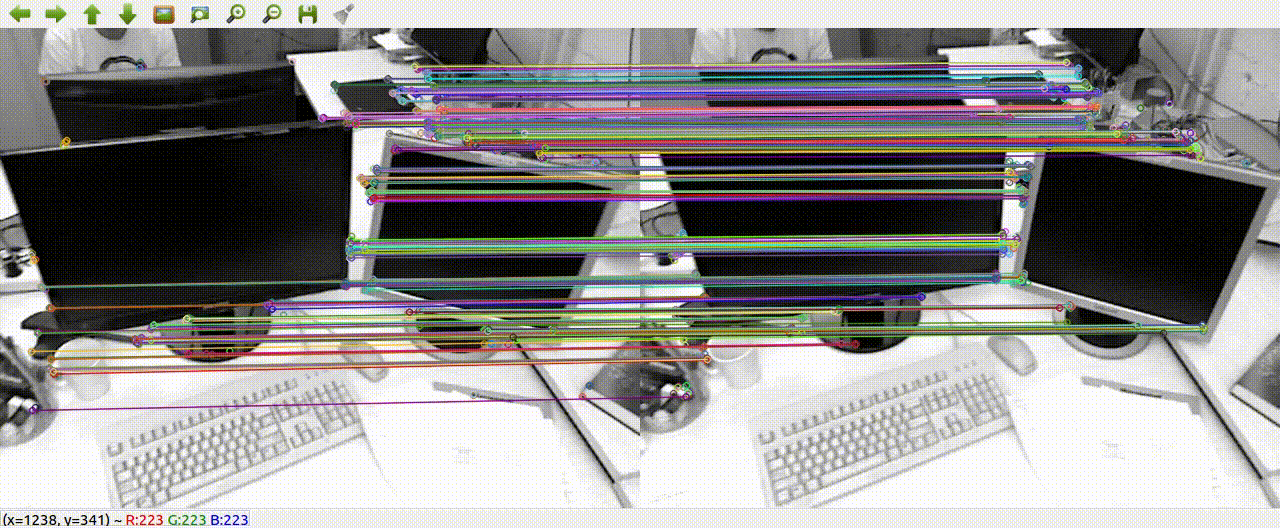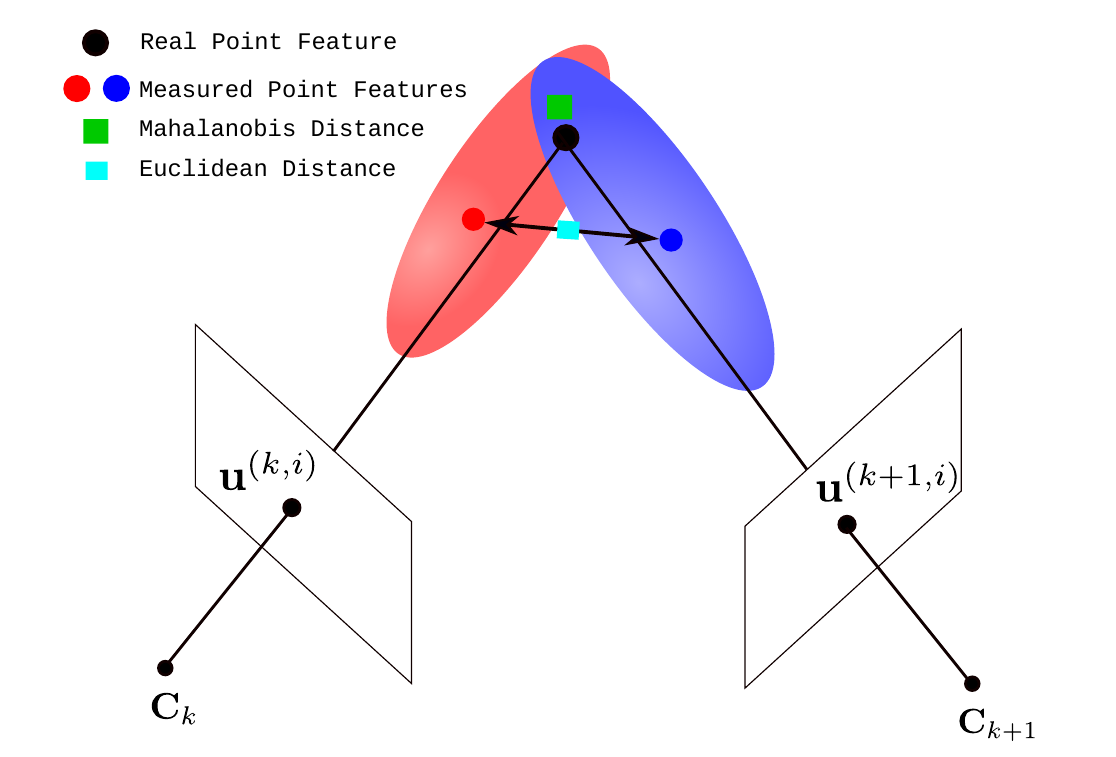CoVO is a Visual Odometry tool that uses RGB-D images to estimate the relative pose (position and orientation) of a camera and the covariance of the pose estimation.
CoVO was built because there was no Visual Odometry tool that can provide uncertainty of pose estimations.
CoVO uses sensor noise models of the camera to propagate the measurement errors (epistemic uncertainty) to estimate covariances.
You need to install following libraries:
You don't need to install following libraries since they are kept in thirdparty folder locally:
- spdlog - version 1.x
- moderncpp json - version 3.4.0
- args - version 6.0.4
Let's install dependencies and then CoVO.
Follow this tutorial to build it from source OpenCV
IMPORTANT: Be careful with the version you install and pay attention as to which branch you are in before installing so don't forget to run the following command:
$ git checkout 3.3.1
RECOMMENDATION: instead of using "make install" command, use 'checkinstall' which creates a '.deb' packages so that you easily uninstall it in case somethings goes wrong. "make install" command usually distributes file copies in an ugly fashion:
$ sudo checkinstall
Install the binary package
$ sudo apt-get install libeigen3-dev
Follow the official tutorial to build it from source Ceres-Solver
IMPORTANT: Be careful with the version you install and pay attention as to which branch you are in before installing so don't forget to run the following command:
$ git checkout 1.14.0
Finally, to build CoVO:
git clone https://github.com/ugurbolat/CoVO.git
cd CoVO
mkdir build
cd build
cmake ..
make -j8
If you made it so far without compilation errors, congrats! I know it was not easy :)
If compiled right, you should have the binary file in the build/bin folder. In order for CoVO to run, you need RGB-D images. In this project, TUM RGB-D datasets folder structure is used. Go ahead and download fr1/xyz sequence (since SETTINGS.json includes camera intrinsic parameters as a default) from:
https://vision.in.tum.de/data/datasets/rgbd-dataset/download
Then, execute covo_bin file from the command line. For example, a basic command should look like:
$ ./covo_bin -d /path/to/rgbd_dataset_freiburg1_xyz/
this should take RGB and depth images and output pose and covariance estimation into txt file:
-
Relative Transformations (covo_rel_trans.txt):
Timestamp Position X (in m) Position Y (in m) Position Z (in m) Orientation -Quaternion X Orientation -Quaternion Y Orientation -Quaternion Z Orientation -Quaternion W 1305031102.211214 -0.002386 0.010023 0.013724 -0.001312 -0.003174 -0.001397 0.999993 1305031102.275326 0.000577 -0.004053 0.024954 -0.013117 -0.006330 0.000905 0.999894 -
Trajectory (or Absolute Transformations) (covo_trajectory.txt):
Timestamp Position X (in m) Position Y (in m) Position Z (in m) Orientation -Quaternion X Orientation -Quaternion Y Orientation -Quaternion Z Orientation -Quaternion W 1305031102.175304 0.000000 0.000000 0.000000 0.000000 0.000000 0.000000 1.000000 1305031102.211214 -0.002386 0.010023 0.013724 -0.001312 -0.003174 -0.001397 0.999993 1305031102.275326 -0.001978 0.006034 0.038692 -0.014440 -0.009484 -0.000525 0.999851 -
Covariances (covo_rel_cov):
Pos X Pos Y Pos Z Quat X Quat Y Quat Z Pos X 0.0000056389 -0.0000005284 0.0000003116 -0.0000003563 -0.0000019992 0.0000008177 Pos Y 0.0000081934 0.0000031681 0.0000029919 -0.0000000801 0.0000003453 Pos Z 0.0000054846 0.0000010352 -0.0000005458 0.0000003357 Quat X 0.0000011555 0.0000000343 -0.0000000087 Quat Y 0.0000007731 -0.0000003002 Quat Z 0.0000006722
You can also provide CoVO more arguments, if you like:
./covo_bin -d /path/to/rgbd_dataset_freiburg1_xyz/ -i 10 --draw-matches -t 0
this should take 10 consecutive images, while drawing the key point matches with users control.
For more information about the arguments, use -h argument:
Welcome to CoVO!
CoVO is an Uncertainty-Aware RGB-D Visual Odometry Tool
For more information visit https://github.com/ugurbolat/CoVO
OPTIONS:
-h, --help Display help menu
-s[/path/to/SETTINGS.json],
--settings=[/path/to/SETTINGS.json]
Configuration file of CoVO's settings;
e.g., camera intrinsics, sensor noise
model etc.
Default SETTINGS.json located in
params_settings folder
-d[/path/to/dataset_dir],
--dataset_dir=[/path/to/dataset_dir]
Dataset root directory.
Default dataset located in docs folder
-l[trace, debug, info, warn,
error, critical],
--log_level=[trace, debug, info,
warn, error, critical] Log level settings.
Default is at info level
-o[/path/to/output_dir/],
--output_dir=[/path/to/output_dir/]
Output directory in which CoVO results
will be saved
Default is './'
-i[1,2,...,all],
--no_imgs=[1,2,...,all] No of image pairs to be processed. An
integer or all can be entered
Default is all
--draw-matches Enable flag for drawing matches on image
pairs
Default is disabled
-t[delay in ms],
--time_delay=[delay in ms] Delay btw image readings. This
functionality is only available if
draw_matches is enabled
Default is 0 which means it will wait
indefinitely for key press to process
next image pairs

